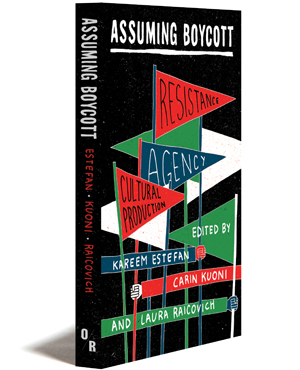Edited by Kareem Estefan, Carin Kuoni, and Laura Raicovich
OR Books
230 pages • Paperback ISBN 978-1-682190-92-0 • E-book 978-1-68219-093-7
Buy this book from the editor’s website

About the Book
Boycott and divestment are essential tools for activists around the globe. Today’s organizers target museums, universities, corporations, and governments to curtail unethical sources of profit, discriminatory practices, or human rights violations. They leverage cultural production – and challenge its institutional supports – helping transform situations in the name of social justice.
The refusal to participate in an oppressive system has long been one of the most powerful weapons in the organizer’s arsenal. Since the days of the 19th century Irish land wars, when Irish tenant farmers defied the actions of Captain Charles Boycott and English landlords, “boycott” has been a method that’s shown its effectiveness time and again. In the 20th century, it notably played central roles in the liberation of India and South Africa and the struggle for civil rights in the U.S.: the 1955 Montgomery bus boycott is generally seen as a turning point in the movement against segregation.
Assuming Boycott is the essential reader for today’s creative leaders and cultural practitioners, including original contributions by artists, scholars, activists, critics, curators and writers who examine the historical precedent of South Africa; the current cultural boycott of Israel; freedom of speech and self-censorship; and long-distance activism. Far from withdrawal or cynicism, boycott emerges as a productive tool of creative and productive engagement.
Including essays by Nasser Abourahme, Ariella Azoulay, Tania Bruguera, Noura Erakat, Kareem Estefan, Mariam Ghani with Haig Aivazian, Nathan Gray and Ahmet Öğüt, Chelsea Haines, Sean Jacobs, Yazan Khalili, Carin Kuoni and Laura Raicovich, Svetlana Mintcheva, Naeem Mohaiemen, Hlonipha Mokoena, John Peffer, Joshua Simon, Ann Laura Stoler, Radhika Subramaniam, Eyal Weizman and Kareem Estefan, and Frank B. Wilderson III.
230 pages • Paperback ISBN 978-1-682190-92-0 • E-book 978-1-68219-093-7
About the Editors
Kareem Estefan is an art critic, writer, editor, and doctoral candidate in Brown University’s Modern Culture and Media department, where he researches contemporary visual culture and the intersections of art, media, and politics, with a focus on the Middle East. His writing on contemporary art and cultural activism has appeared in Art in America, Art-Agenda, BOMB, The Brooklyn Rail, Frieze, Ibraaz, and The New Inquiry, among other places. From 2012–2015, Estefan was Associate Editor of Creative Time Reports, an online magazine of the New York-based public art nonprofit Creative Time, where he worked closely with artists such as James Bridle, Mel Chin, Molly Crabapple, Mariam Ghani, Emily Jacir, Naeem Mohaiemen, and Ahmet Öğüt on texts that addressed pressing political issues.
Carin Kuoni is a curator and editor whose work examines how contemporary artistic practices reflect and inform social, political and cultural conditions. She is Director/Curator of the Vera List Center for Art and Politics at The New School and teaches there. A founding member of the artists’ collective REPOhistory, Kuoni has curated and co-curated numerous transdisciplinary exhibitions, and edited and co-edited several books, among them Energy Plan for the Western Man: Joseph Beuys in America; Words of Wisdom: A Curator’s Vademecum; Speculation, Now; and Entry Points: The Vera List Center Field Guide on Art and Social Justice. She is the recipient of a 2014 Andy Warhol Foundation Curatorial Fellowship, directed “SITAC XII: Arte, justamente” in Mexico City in 2015, and is a Travel Companion for the 57th Carnegie International in 2018.
Laura Raicovich is President and Executive Director of The Queens Museum of the City of New York. A champion of socially engaged art practices that address the most pressing social, political, and ecological issues of our times, she has defined her career with artist-driven projects and programs. Recent projects at the Queens Museum include “Mierle Laderman Ukeles: Maintenance Art”; “William Gropper: Bearing Witness”; “Mickalene Thomas: Untitled”; “Mariam Ghani: Garden of Forked Tongues”; “Duke Riley: That’s What She Said”; “Hey! Ho! Let’s Go: Ramones and the Birth of Punk,” as well as a series of programs designed with Rebecca Solnit and Joshua Jelly Shapiro to launch their “Nonstop Metropolis: A New York City Atlas.” She lectures internationally, has contributed regularly to The Brooklyn Rail, and is the author of A Diary of Mysterious Difficulties and At the Lightning Field.
Table of Contents
Introduction by Kareem Estefan
I. The Cultural Boycott of Apartheid South Africa
Sean Jacobs, The Legacy of the Cultural Boycott Against South Africa
John Peffer, Art, Resistance, and Community in 1980s South Africa
Hlonipha Mokoena, Kwaito: The Revolution Was Not Televised; It Announced Itself in Song
Frank B. Wilderson III, Incognegro: A Memoir of Exile and Apartheid (excerpt)
II. BDS and the Cultural Boycott of Israel
Ariella Azoulay, “We,” Palestinians and Jewish Israelis: The Right Not to Be a Perpetrator
Noura Erakat, The Case for BDS and the Path to Co-Resistance
Eyal Weizman and Kareem Estefan, Extending Co-Resistance
Nasser Abourahme, Boycott, Decolonization, Return: BDS and the Limits of Political Solidarity
Joshua Simon, Neoliberal Politics, Protective Edge, and BDS
Yazan Khalili, The Utopian Conflict
III. Who Speaks? Who Is Silenced?
Tania Bruguera, The Shifting Grounds of Censorship and Freedom of Expression, from Cuba to Israel
Naeem Mohaiemen, The Loneliness of the Long-Distance Campaign
Svetlana Mintcheva, Structures of Power and the Ethical Limits of Speech
Ann Laura Stoler, By Colonial Design: Or, Why We Say We Don’t Know Enough
IV. Dis/engagement From Afar
Chelsea Haines, The Distant Image
Mariam Ghani with Haig Aivazian, 52 Weeks, and Engaging by Disengaging
Nathan Gray and Ahmet Öğüt, Not Walking Away: Participation and Withdrawal in the 2014 Sydney Biennial
Radhika Subramaniam, Loose Connections
